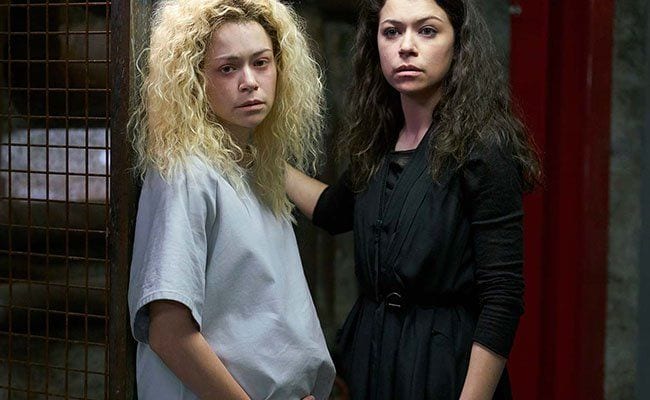
John: Luck shot for a mutation.
Sarah: Yeah. I survived you. We survived you. Me and my sisters together. This is evolution.
Helena: My story is an embroidery with many beginnings and no end. But I will start with the thread of my sestra, Sarah, who stepped off a train one day and met herself.
The final episode of Orphan Black, the aptly titled “To Right the Wrongs of Many”, has plenty to resolve, and thankfully, it does so easily. It puts to bed the larger Neolution plot that’s been driving the story since the beginning, while also offering an emotional end to these characters’ arcs that aren’t only fitting, but earned.
The episode wisely dispatches with John (the maniac formerly known as P.T.) (Stephen McHattie) and Coady (Kyra Harper), who’d managed to survive Helena’s (Tatiana Maslany) brutal attack from last episode, in the first 20 minutes. Helena kills Coady, Sarah kills John, and then they, with the help of Art (Kevin Hanchard), bring Helena’s twins into the world. The birth marks the first major emotional catharsis in the episode, as scenes of Sarah giving birth to Kira — with Mrs. S (Maria Doyle Kennedy) at her side, supporting her like always — are interspersed with Helena’s labor. These twins working together to bring another set of twins into the world, despite every possible obstacle, is as emotionally satisfying a moment as this show has ever done. Maslany’s naked emotion in portraying both Sarah and Helena is a master class in conveying feeling, in all its complexity and messiness. It’s a beautiful moment that stands out in a finale filled with them.
In resolving the Neolution story so early, the rest of the episode is dedicated to the aftermath of its end. Sarah is outwardly pursuing her GED (although she walks out when it’s time to take the exam), Helena is raising her babies with Alison and Donnie’s (Kristian Bruun) help, and Cosima, along with Delphine (Evelyne Brochu) and Scott (Josh Vokey) are trying to locate the rest of the LEDA sisters to pass along the cure. While the other sisters are clearly moving forward, however, Sarah is stuck. She’s intent on selling the house she and Kira (Skyler Wexler) shared with Mrs. S, despite Felix’s (Jordan Gavaris) attempts to convince her otherwise, and start a new life somewhere else, even if it’s away from her sisters.
The culmination of the episode is Helena’s baby shower, beautifully mirroring her dream baby shower from the beginning of season three, minus the elaborate costuming. As the sisters gather together to celebrate, Sarah is plainly grieving for Mrs. S. She didn’t have the opportunity to truly mourn and now that the fight is over, she’s drowning in her grief, with no real outlet for it. When Sarah admits “I don’t know how to be happy”, it’s an opportunity for her sisters to provide the kind of support she’s only ever consistently had from Mrs. S. It’s a passing of the torch in a way, while also cementing that these women truly know and understand one another; it’s as gratifying a moment as it gets.
Again, it’s impossible not to mention Maslany’s remarkable gifts in this scene. She plays Sarah, Helena, Alison, and Cosima — each with their own gestures and mannerisms — gathered closely together in a scene that covers much emotional ground, while also inserting enough of the signature Orphan Black humor that Helena and Alison deliver so effortlessly. Sarah’s slouch is different from Cosima’s lounge, and Alison’s perfect posture, and Helena’s childlike sitting. Maslany effortlessly conveys singular personalities and their dynamics in gestures as simple as these.
It should also be mentioned that Maslany, and the show, would never have been able to accomplish all they have without the extraordinary and often thankless work of her scene partner, Kathryn Alexandre. The many takes for a scene like this one to come together is a team effort, with Maslany undoubtedly at its center, but its success is difficult to imagine without the connection built between Maslany and Alexandre over five seasons. Whatever the legacy of Orphan Black, it’ll always be the series that gave Maslany the opportunity to show what an extraordinary actor she is, and hopefully, Alexandre will also soon be given the chance to showcase her skills in a more traditional way.
This isn’t a show that chose to go out in a big battle sequence; rather it ended happily for the sisters who’ve already battled more than any one family ever should. That they’re firmly in each other lives, in all its alternating mundanity and higher purpose, speaks to the fact that these women are survivors, but above all, they’re family. It’s a message the show has continually emphasized, even when the sisters weren’t always ready to acknowledge it.
The strength and perseverance they’ve exhibited over and over again, and the community built by these women leaves them in a place where Alison and Donnie are as silly and in love as they’ve ever been, Helena is surrounded by the family she never had the chance to experience growing up, Cosima and Delphine are finding and curing the 274 LEDA sisters all around the world, and Sarah is slowly but surely finding some peace and happiness in stability. Even Rachel, whose final act was passing along the list of 274, appears to have found some measure of her own peace.
Orphan Black has consistently delivered on the twisty plot that drove 50 episodes worth of story; more than that, it went out of its way to tackle issues of gender and sexuality, all the while upending the conventions of family. There’s much to be grateful for after five seasons of Orphan Black, but the way it always put women at the center of its story, never shortchanging their complexity for likability or easy solutions, is what will most be remembered, and ultimately, missed.

